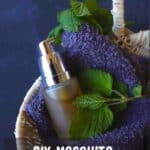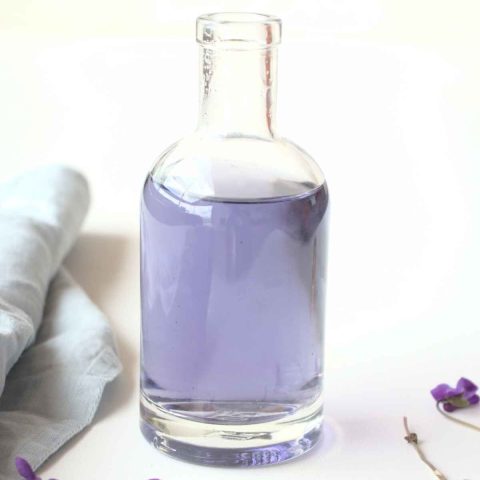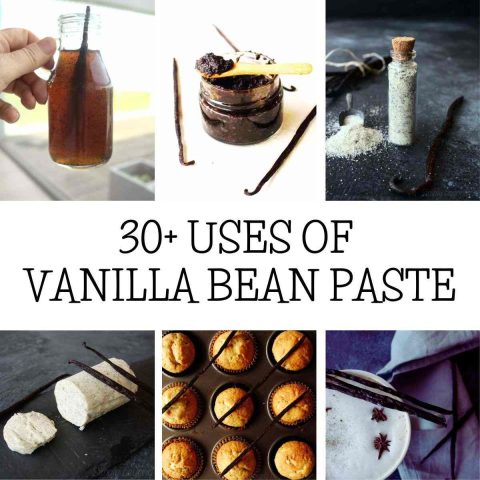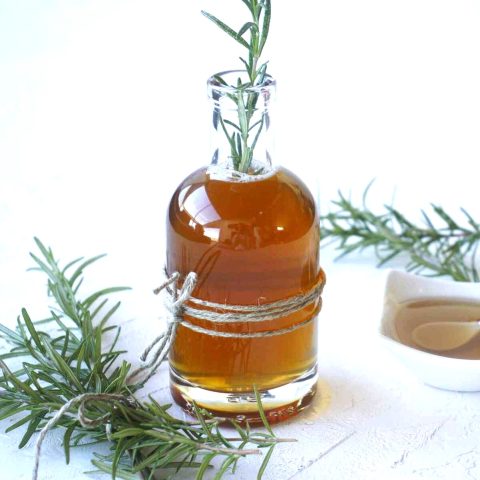This lemon balm mosquito repellent is a homemade herbal formula that keeps away insects, bugs and mosquitoes naturally.

Summer is behind the corner and I already made my plans for holidays and would love to spend some time camping. Camping brings all positive memories, surrounded by beautiful nature and making campfires. While I love everything about camping, one thing that bothers me are bugs, mosquitoes or other types of insects. Equipped with homemade sunscreen and the best sleeping bag I was keen to copy my success with homemade bug spray rather than to buy bug spray packed with chemicals.
I have plenty of lemon balm in my backyard and with little bit of further research I was convinced that I got the right herbal alternative to pesky chemicals.
Lemon balm repels mosquitoes
Lemon balm, like sweet pea flower has been used for centuries to repel mosquitoes naturally. People grow this herb in their garden to keep mosquitoes and other insects away. With just simple application of crushed leaves of lemon balm you can rub them on the skin for immediate relief.
Lemon balm benefits
Lemon balm is known for its calming properties to alleviate anxiety, insomnia and ease pain and discomfort from indigestion. Its lemony fragrance is produced by volatile oils citral, citronellal, citronellol, and geraniol that help calm down the muscle tension and contribute to easing digestion. The same volatile oils are actually the compounds that can repel mosquitoes. While people love its lemony scent and often use them in perfumes, mosquitoes actually hate it which makes it a perfect addition for our diy mosquito spray.
The citronellol is often used in perfumes and is also considered a good mosquito repellent. Citronellal also possess insect repellent properties against mosquitoes as well as strong antifungal activities. And geraniol is commonly used in perfumes as well as insect repellent.
While using crushed leaves of lemon balm to repel the insects is fine, I prefer using a more convenient way to wrap all herbal powers into one small bottle that I can carry with me whenever I go camping.

lemon balm plant mosquito repellent ingredients
Lemon balm tincture
Making calming lemon balm tea is my favorite way to relax.
The best way to preserve the power of herbs in a bottle is to prepare the lemon balm in alcohol as a tincture or lemon balm oil. While the process is easy, it is time-consuming as you need at least 4 weeks of maceration to make a strong and potent tincture or oil.
Discover 20+ ways to use lemon balm in recipes and remedies.
Witch hazel
It is wise to dilute the strong alcohol lemon balm tincture with healing and antibacterial witch hazel, often used in many cosmetic and beauty products. Witch hazel possesses astringent properties and is helpful against skin sores, bruises or even acne.
Adding essential oils that reppel mosquitoes
Use any or a combination of these essential oils to make an ideal blend.

How to use this homemade spray for mosquitoes and safety tips
- Before applying to larger areas, test it on a small patch of skin – some people might be sensitive to some of the ingredients.
- Keep this spray away from your face, mouth and eyes in particular
- Don’t ingest it
- The volatile oils will eventually wear off, so you will need to reapply every two hours to be protected. Ideally you should apply it every 1-2 hours
- No need to soak your skin in the repellents, just simply spray enough to reach all exposed areas so you will be safe from all mosquitoes or insects.
- If you’re pregnant, nursing, or have chronic health issues consult a qualified professional for further guidance on usage for your condition before use. Do you own research specifically on essential oils.
- This spray is not intended for pets
Why make your own lemon balm plant mosquito repellent?
1. Free of chemicals
You might have sensitive skin or just simply search for the most gentle way of keeping the mosquitoes or bugs away. Most store bought insect repellents use DEET, which is a chemical that is actually quite dangerous. There’s no point in using DEET if you can use other natural homemade bug sprays
In this study by Dr. Abou Donia says that DEET causes “neurons to die in regions of the brain that control muscle movement, learning, memory, and concentration”. It also states that children are at a higher risk for brain changes after DEET exposure because their skin absorbs it more readily.
2. Cost effective
Honestly the price of store bought repellent is rather shocking. This DIY bug spray doesn’t cost more than 5 bucks and you can use the same ingredients to make different repellents. It is actually much cheaper to make your own repellents and have control over the ingredients you use
3. This recipe will last over 3 years at minimum
Its shelf life is very stable and doesn’t need to be kept in the fridge. Just keep it in a dark cool place out of direct sunlight.

How to make this lemon balm mosquito repellent
First step
start with the lemon balm tincture. To achieve high quality potent tincture I prefer using 2 handfuls of fresh lemon balm leaves and stems. The fragrant volatile oils are more powerful in fresh material rather than dried. Chop them and place them into a sterilized jar. Pour 80 proof alcohol to cover the leaves.
Chop fresh leaves and stems of lemon balm to increase the surface area for the maceration and place it into a sterilized jar filling it to 3/4. Then pour in 80 proof vodka or grain spirit to cover the lemon balm near the top of the jar. Cover the jar and set it in a cool place, shaking occasionally. After at least 4 weeks (I prefer 6-8 weeks) of maceration, strain the leaves through a cheesecloth and your tincture is ready.

Second step
Pour equal amount of lemon balm tincture and witch hazel into a spray bottle and shake it to combine

Third step
add essential oils
40 drops of one or combination of other recommended essential oil – the total quantity should not exceed 40 drops.
Fourth step
mix it well, label it and store it in a cold dark place.
How to use this lemon balm bug spray
Keep it handy in your bag or rucksack so you have it ready every time you go camping or hiking
Shake the spray bottle before every use as oils and water will separate
Reapply every two hours. It depends on many factors including your chemistry, activity you are doing, on the weather and place you are.
I also include this bug bite cream in case of a random bug bite!

Lemon balm mosquito repellent

Materials
- 50 ml (¼ cup) lemon balm tincture
- 50 ml (¼ cup) witch hazel
- 20 drops lavender essential oil
- 20 drops tea tree oil
Tools
Instructions
- Pour lemon balm tincture and with hazel into a spray bottle
- add essential oils. 40 drops of one or a combination of other recommended essential oil - the total quantity should not exceed 40 drops.
- mix it well, label it and store it in a cold dark place.
Notes
Shake the spray bottle before every use as oils and water will separate
Reapply every two hours.
Recommended Products
As an Amazon Associate and member of other affiliate programs, I earn from qualifying purchases.













How do you make the bug balm cream
Please
Hi Carol, here is a post for bug bite cream with a recipe card https://simplybeyondherbs.com/bug-bite-cream/
hi vladka!
love your posts(frequent reader-first time writer😁)!
quick question: i know lemon balm and lemon verbena are different plants -but smell similar- can they be used interchangeably? or are their oils different?
thank you in advance
C.
Hi Corriena, thank you so much for your kind words 😊
You’re right, lemon balm (Melissa officinalis) and lemon verbena (Aloysia citrodora) are different plants, and while their scents are similar, their essential oil compositions are quite different. Lemon balm oil contains more citral and certain calming compounds, while lemon verbena is higher in limonene and has a fresher, sharper citrus note. For a mosquito repellent, you could use them interchangeably for fragrance, but lemon balm is often preferred because some studies suggest it’s more effective at deterring insects.